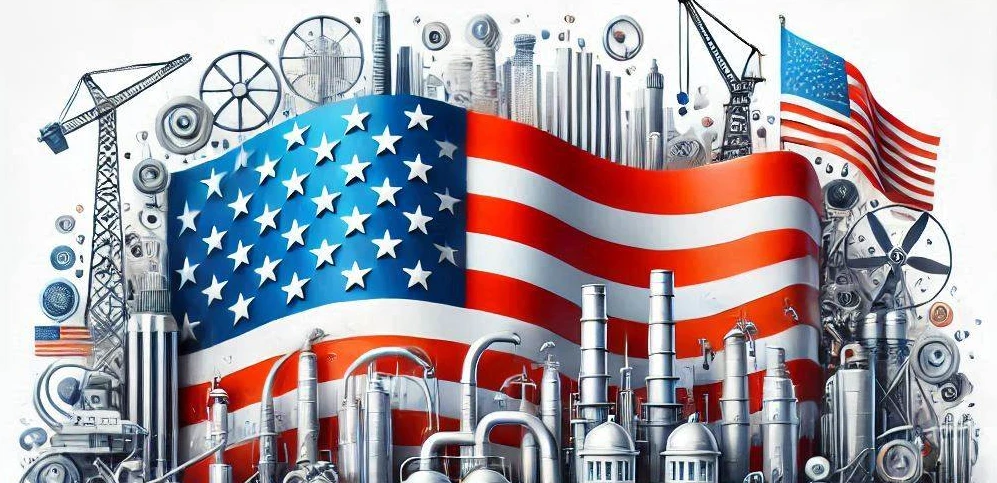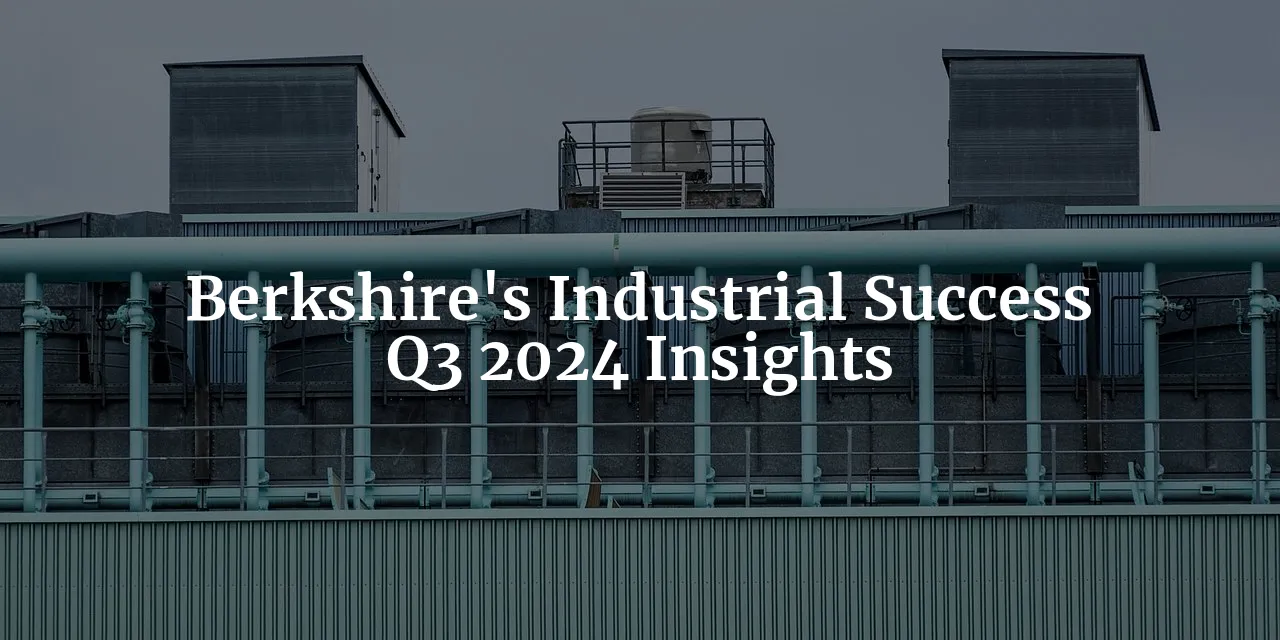Tags: PCC / Lubrizol / Marmon / IMC
This fanpage is not officially affiliated with Berkshire Hathaway: Disclaimer
The macroeconomic landscape in the U.S. is buzzing with activity: from Trump’s re-election campaign to widespread strikes and the aftermath of a major hurricane. In this dynamic environment, Berkshire Hathaway's industrial products group has shown remarkable resilience in Q3 2024. This article takes a closer look at the group’s performance, highlighting Precision Castparts’ soaring revenues, Lubrizol’s innovative expansions, and the challenges faced by its key subsidiaries.

Introduction
In the vast and diverse portfolio of Berkshire Hathaway, the industrial products segment stands as a cornerstone of innovation and resilience. As a conglomerate renowned for its strategic investments and robust performance, Berkshire's industrial arm plays a pivotal role in its long-term vision. This article aims to provide shareholders with a comprehensive analysis of the industrial products group's performance in the third quarter of 2024, delving into the intricacies of each subsidiary and their contributions to the conglomerate's success.
The strategic importance of this segment cannot be overstated, especially in the context of global economic trends. As the world navigates through complex geopolitical landscapes and evolving market dynamics, Berkshire's industrial products group continues to adapt and thrive. This adaptability is not new; it mirrors the company's historical ability to weather economic cycles and emerge stronger. By drawing parallels with past economic scenarios, we can better appreciate the strategies that have propelled Berkshire to the forefront of the industrial sector.
In today's geopolitical and economic climate, the industrial sector faces unique challenges and opportunities. From shifting trade policies to supply chain disruptions, understanding these factors is crucial for appreciating the group's overall performance. Each subsidiary, with its distinct focus and market, contributes uniquely to the conglomerate's success. This article will explore these contributions, offering a blend of factual analysis and historical insights to provide a holistic view of the industrial products group's trajectory.
In the sections that follow, we will delve into the resurgence of the industrial sector, explore the success stories of subsidiaries like Precision Castparts Corp. and Lubrizol, and navigate the challenges faced by Marmon and IMC. We will also consider the broader economic context and conclude with reflections on the future of Berkshire's industrial group. Through this journey, we aim to equip shareholders with the knowledge to appreciate the strategic foresight and operational excellence that define Berkshire Hathaway's industrial products segment.
The Industrial Renaissance
The year 2024 marks a remarkable resurgence of the industrial sector, a phenomenon that is both surprising and encouraging amidst global economic challenges. This resurgence is evidenced by the increased revenues and earnings reported by Berkshire Hathaway's industrial products group. In the third quarter alone, revenues surged by $289 million, a 3.3% increase compared to the previous year, while pre-tax earnings rose by $62 million, a 4.3% increase 1. This growth is a testament to the sector's resilience and adaptability in the face of adversity.
A key driver of this industrial renaissance is the role of technological advancements and manufacturing efficiencies. Drawing parallels with historical industrial revolutions, we see a pattern where innovation and efficiency have consistently propelled growth. Today, as we stand on the brink of a new era, these factors continue to shape the industrial landscape, enabling companies to meet emerging market demands with agility and precision.
Geopolitical factors, such as trade policies and international relations, also play a significant role in shaping industrial production and supply chains. In this context, Berkshire's subsidiaries have strategically positioned themselves to capitalize on these dynamics. By aligning with favorable trade policies and navigating complex international relations, they have managed to sustain growth and maintain competitive advantages, reminiscent of historical business strategies that prioritized adaptability and foresight.
To illustrate the diverse performance within the group, consider the following table comparing revenue and earnings growth across different subsidiaries 1:
| Subsidiary | Q3 Revenue | Q3 2024 to Q3 2023 Revenue Growth | Q3 2024 to Q3 2023 Earnings Growth |
|---|---|---|---|
| PCC | $2.6b | 11.9% | 25.1% |
| Lubrizol | $1.6b | 2.8% | 36.2% |
| Marmon | $3.1b | ~0% | -13.0% |
| IMC | $1.0b | -1.4% | -13.0% |
This table highlights the varied trajectories of each subsidiary, showcasing both the successes and challenges within the industrial products group 1.
Precision Castparts Corp.: A High-Flying Success
Precision Castparts Corp. (PCC) has soared to new heights in Q3 2024, demonstrating a remarkable performance that underscores its strategic significance within Berkshire Hathaway's industrial portfolio. With revenues reaching $2.6 billion in Q3 and an impressive $7.7 billion over the first nine months of 2024, PCC has achieved substantial growth rates of 11.9% and 12.4%, respectively, compared to the previous year 1. This success is further amplified by a 25.1% increase in pre-tax earnings for Q3 and a 23.4% rise over the first nine months of 2024, showcasing PCC's robust financial health and operational efficiency 1.
The driving forces behind PCC's success are multifaceted. The increased demand for aerospace products, coupled with improved manufacturing efficiencies, has played a pivotal role in boosting the company's performance 1. This trend echoes the historical significance of aerospace advancements, reminiscent of past industrial booms that propelled economic growth and innovation. As the aerospace sector continues to evolve, PCC stands at the forefront, capitalizing on these opportunities to solidify its market position.
However, PCC's journey has not been without its challenges. The recent settlement with the U.S. Department of State highlights the importance of compliance in today's business landscape 2. The settlement, which addresses 24 violations of the Arms Export Control Act (AECA) and the International Traffic in Arms Regulations (ITAR), underscores the critical need for proper authorization in exporting technical data 2. Despite these hurdles, PCC's proactive approach to compliance improvements reflects a broader trend of corporate governance and ethical business practices.
Key components of the settlement agreement include:
- A civil penalty of $3 million, with $1 million suspended for Department-approved remedial compliance measures 2.
- The appointment of an Internal Special Compliance Officer (ISCO) for a minimum of two years 2.
- An external audit of PCC's ITAR compliance program, along with additional compliance measures 2.
These measures not only ensure PCC's adherence to regulatory standards but also position the company for sustainable growth in the future. As PCC continues to navigate the complexities of the global aerospace market, its strategic positioning within Berkshire's industrial portfolio remains strong, offering significant potential for future expansion and innovation.
Lubrizol: Innovation and Expansion
Lubrizol has demonstrated its commitment to innovation and expansion, achieving steady revenue growth and a substantial increase in pre-tax earnings in Q3 2024. With revenues of $1.6 billion, marking a 2.8% increase over 2023, and a 36.2% rise in pre-tax earnings, Lubrizol's financial performance is bolstered by lower raw material costs and higher sales volumes 1. These achievements highlight the company's strategic agility and operational excellence.
A key component of Lubrizol's growth strategy is its focus on the Indian market. The recent Memorandum of Understanding (MoU) with Polyhose to expand medical tubing manufacturing in Tamil Nadu is a testament to Lubrizol's commitment to innovation in the Indian medical sector 3. This initiative aims to increase local medical tubing volume five-fold, improving access to life-saving products in India and export markets 3. Such strategic initiatives are reminiscent of historical international business expansions that have driven economic growth and fostered global trade.
Lubrizol's investment in India's manufacturing sector is significant, drawing parallels with historical industrial collaborations that have shaped global markets. The company's recent investments and expansions in India are showcased in the table below:
| Investment/Expansion | Details |
|---|---|
| Medical Manufacturing Site | New site in Tamil Nadu for medical tubing production 3. |
| Global Capability Center (GCC) | Opened in Pune to enhance innovation and growth 3. |
| Largest Manufacturing Facility | 120-acre plot in Aurangabad 3. |
| CPVC Resin Plant | Constructing a 100,000 metric-ton plant in Vilayat, Gujarat 3. |
| Doubling CPVC Compound Capacity | Expansion at Dahej, Gujarat site 3. |
Furthermore, Lubrizol's new channel partnership with Oil Store enhances its market presence in the U.K., Europe, Middle East, and North Africa, offering a range of industrial refrigeration products and solutions 4. This partnership reflects Lubrizol's strategic alignment with Berkshire's global growth objectives, positioning the company to drive future innovation and capture new market opportunities.
In conclusion, Lubrizol's strategic initiatives and investments underscore its commitment to global growth and innovation. As the company continues to expand its footprint and enhance its product offerings, it remains a key player in Berkshire Hathaway's industrial portfolio, poised to capitalize on emerging opportunities and drive sustained success.
Marmon and IMC: Navigating Challenges
In the third quarter of 2024, Marmon and IMC faced significant challenges within Berkshire Hathaway's industrial products group. Despite the overall growth in revenues and pre-tax earnings for the group, these two subsidiaries experienced declines that underscore the complexities of the current industrial landscape 1.
Marmon's Performance Hurdles
Marmon, a conglomerate of over 100 autonomous manufacturing and service businesses, saw its revenues remain relatively unchanged at $3.1 billion in Q3 2024, with a notable 2.6% decrease over the first nine months of the year compared to 2023. The decline in pre-tax earnings by 13.0% in Q3 and 9.4% over the same period highlights the pressures faced by the company. A primary contributor to this downturn was the Transportation Products group, which experienced nearly a 20% decline in revenues 1. Historically, industrial downturns have often been met with strategic pivots, such as diversification of product lines or geographic expansion, which Marmon may consider to bolster its future performance.
IMC's Currency and Sales Challenges
IMC, specializing in metal cutting tools and systems, also faced headwinds with a 1.4% decrease in Q3 revenues and a 13.0% drop in pre-tax earnings 1. The challenges for IMC were compounded by lower organic sales and unfavorable foreign currency translation, reminiscent of past industrial challenges where currency fluctuations have impacted global operations. Strategic responses might include enhancing operational efficiencies or leveraging acquisitions to offset these declines.
Strategic Responses and Resilience
- Diversification and Innovation: Both Marmon and IMC could explore diversifying their product offerings and investing in innovative technologies to capture new market segments.
- Operational Efficiency: Streamlining operations to reduce costs and improve margins could provide a buffer against revenue declines.
- Geographic Expansion: Expanding into emerging markets with robust demand could offer new growth avenues.
- Currency Hedging: Implementing robust currency hedging strategies might mitigate the impact of foreign exchange fluctuations.
Looking forward, Marmon and IMC can draw inspiration from historical industrial turnarounds, where companies have successfully navigated economic challenges through strategic foresight and adaptability. The resilience of Berkshire's industrial group remains a testament to its ability to weather market changes and emerge stronger.
The Broader Economic Context
The broader economic environment in 2024 presented a mixed bag of challenges and opportunities for the industrial sector. Higher interest rates and geopolitical uncertainties have weighed heavily on industrial production, echoing past periods of economic volatility 5. Despite these headwinds, technological advancements, particularly in AI and machine learning, have begun to reshape the manufacturing landscape, much like previous technological revolutions.
Labor Market and Supply Chain Dynamics
The U.S. labor market faced significant challenges, with talent shortages and rising compensation costs being major concerns. Nearly 60% of manufacturers cited difficulties in attracting and retaining employees, reflecting a historical trend of labor market tightness 5. Moreover, global supply chain disruptions have continued to impact industrial production, drawing parallels with past supply chain crises. These disruptions have necessitated investments in supply chain planning software, with 78% of manufacturers implementing or planning to invest in such technologies 5.
Economic Indicators and Policy Implications
| Economic Indicator | Status |
|---|---|
| PMI | Contracting since July 2024 5 |
| Employment Trends | Stabilized at around 13 million 5 |
| Compensation Costs | Rising, with a 3.8% year-over-year increase 5 |
The potential implications of policy changes post-2024 U.S. elections also loom large over the industrial sector. Historical political shifts have often led to changes in regulatory and economic landscapes, and the current environment is no exception. Manufacturers are bracing for potential impacts on supply chains and demand, while also exploring opportunities for growth through technological investments.
Resilience and Future Growth
Despite these challenges, the industrial sector's resilience remains evident. With strategic investments in technology and a focus on operational efficiency, the sector is well-positioned to drive future economic growth. The lessons of past economic cycles suggest that those who adapt and innovate will emerge as leaders in the next industrial renaissance.

Conclusion
As we reflect on the third quarter of 2024, it is evident that Berkshire Hathaway's industrial products group has navigated a complex landscape marked by both successes and challenges. The resurgence of the industrial sector, highlighted by significant revenue and earnings growth across key subsidiaries like Precision Castparts Corp. and Lubrizol, underscores the strategic importance of this segment within Berkshire's diverse portfolio. The impressive 11.9% revenue growth at PCC and the remarkable 36.2% increase in pre-tax earnings at Lubrizol are testaments to the power of innovation and operational excellence that define Berkshire's industrial strategy 1.
However, it is crucial to acknowledge the hurdles faced by Marmon and IMC, which experienced stagnation and declines in their financial performance. These challenges remind us of the cyclical nature of the industrial sector, echoing historical patterns where companies have had to adapt and pivot in response to market dynamics. Just as past industrial leaders have thrived through innovation and diversification, so too must Marmon and IMC embrace new strategies to enhance their competitive positioning.
The broader economic context, characterized by geopolitical uncertainties, labor market challenges, and supply chain disruptions, further complicates the landscape for industrial players. Yet, the historical resilience of the industrial sector offers a promising outlook. As we have seen, those who invest in technological advancements and prioritize operational efficiency are well-positioned to capitalize on emerging opportunities, much like the transformative industrial revolutions of the past.
Looking ahead, the industrial products group remains a dynamic and integral part of Berkshire Hathaway's overall success and shareholder value. The commitment to sustainability and clean technology will not only align with global trends but also ensure long-term viability in an ever-evolving market. As shareholders, it is imperative to view this segment as a cornerstone of Berkshire's strategic vision, one that is poised for continued growth and innovation.
References
-
2024 Third Quarter Report - Industrial Products - www.berkshirehathaway.com ↩↩↩↩↩↩↩↩↩↩↩
-
U.S. Department of State Concludes $3 Million Settlement Resolving Export Violations by Precision Castparts Corp. - www.state.gov ↩↩↩↩↩
-
Lubrizol and Polyhose Sign MoU to Manufacture Medical Tubing, Expand Capacity in Chennai - www.lubrizol.com ↩↩↩↩↩↩↩
-
Lubrizol Expands Collaboration with Oil Store - Lubrizol - www.lubrizol.com ↩
-
2025 Manufacturing Industry Outlook - www2.deloitte.com ↩↩↩↩↩↩
-
US job market bounces back from impact of strikes, hurricanes - www.reuters.com ↩












